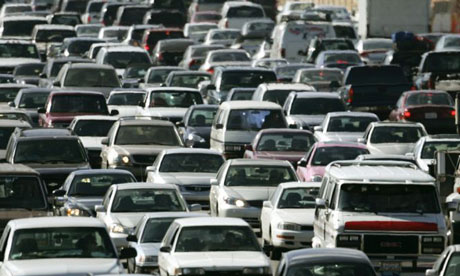Late last week I had to drive to the Young Greens camp at Jeanette Fitzsimon’s farm in the Coromandel. In years past, I have travelled to the camp by a combination of bicycle and ferry, or caught a ride with others, but this time my schedule required that I drive. In the middle of the day on a Friday, I was frantically trying to respond to emails, field phone calls, and put out a press release. But I couldn’t deal with any of that while I was driving.
One of the greatest (heretofore uncounted) benefits of enabling more people to use passenger transport will be all the time they get back. At the moment most people have to drive themselves to work every day. It is a massive time suck – and it takes a great deal of mental energy. Now that many people have access to mobile devices, time on the bus, ferry or train can be enormously productive. Even if you don’t have access to the internet or a phone, a huge advantage of being a passenger (assuming the conditions of the service are reasonable and not overcrowded) is that you can read or just relax.
In his fascinating book, Traffic, Tom Vanderbilt makes the point that driving is one of the most complicated mental tasks we do.
For those of us that are not brain surgeons, driving is probably the most complex everyday thing we do in our lives. Researchers have estimated there are anywhere from 1500-2500 discrete skills and activities we undertake while driving. Even the simplest thing – shifting gears – is a decision-making process consuming what is called cognitive workload.
It requires an extraordinary amount of attention for our brains to process (and discard) huge amount of information, especially while operating heavy machinery, moving at speeds that we simply did not evolve to move at. We have to make snap decisions based on limited situational information and guesses about what others on the road are going to do. This takes a huge amount of mental energy and can be quite stressful in peak traffic conditions.
At the moment time travel savings are the largest economic benefit counted for new motorway projects. For any given RONS, about 80% of the supposed economic benefit will be assessed as forecast time savings – usually very small increments of time (2-5minutes) for each vehicle.
The economic evaluation manual counts travel time savings similarly when a new project will reduce travel time for buses or trains. However, we don’t consider the benefit of freeing people up from having to be their own drivers.
Imagine a rail project, like the CRL, enables thousands of people to leave the car at home a few days a week because of increased frequency and reliability. There will definitely be a congestion reduction benefit from removing thousands of cars of the road at peak time, so it will benefit those who still want or need to drive. But even if the journey is a similar time as their former car trip – say 25 minutes – it is actually 25 minutes saved per person who no longer has to drive. Whether they use the time reading, writing, talking on the phone, tweeting, or staring out the window, there will be a productivity benefit of 25 minutes not having to concentrate.
Some will say driverless cars are the answer. That may be true for those who can afford them, some years or decades in the future. But for many it will be as convenient, and much cheaper, to get the bus or train, provided the service is frequent and comfortable. That’s why we need to make proper passenger transport, along with safe walking and cycling, a priority for our cities now.






I currently use the train for my daily to and fro, and I personally hope I never have a job where I can’t use it. This column is dead on, I get plenty done on my ride in on the train – like reading TDB posts!
One of the greatest (heretofore uncounted) benefits of enabling more people to use passenger transport will be all the time they get back.
Minto has been talking about this for sometime, he said it during his mayoral campaign for free and frequent public transport. He also added into the mix free wifi which is what they have in Invercargill.
I used to get the train from Sturges Rd to Britomart or Grafton. I bought a motorbike because I’m lucky enough to work flexi hours so I commute outside of rush hour and it takes me 25 minutes each way, instead of 80 by train, including a 15-20 minute walk.
I wrote half my PhD thesis on the train between Exeter and Plymouth. Thing is, those trains had comfortable chairs, tables and power outlets (also, but less relevant, epic scenery). Auckland trains have none of these things. I got sick of tweeting from the train or reading a book when I’d rather be relaxing at home with my family. The traffic is still vile, even outside of rush hour, but I’ll take my chances amongst the HGVs, morons and road-warriors rather than slumped in an uncomfortable chair, waiting for the train to wind its way at a snail’s pace through half of West Auckland.
>> those trains had comfortable chairs, tables and power outlets <<
These are good points, and do need to be addressed. I use public transport when I'm in Ak, but PunkScience is correct that it's uncomfortable. Free wi-fi usable on the train or bus would be awesome too. In fact, I think free public internet access is a key infostructural component of the public broadcasting of the 21st century. This could sit alongside value-added private internet in the same way that public libraries sit alongside bookshops.
Comments are closed.